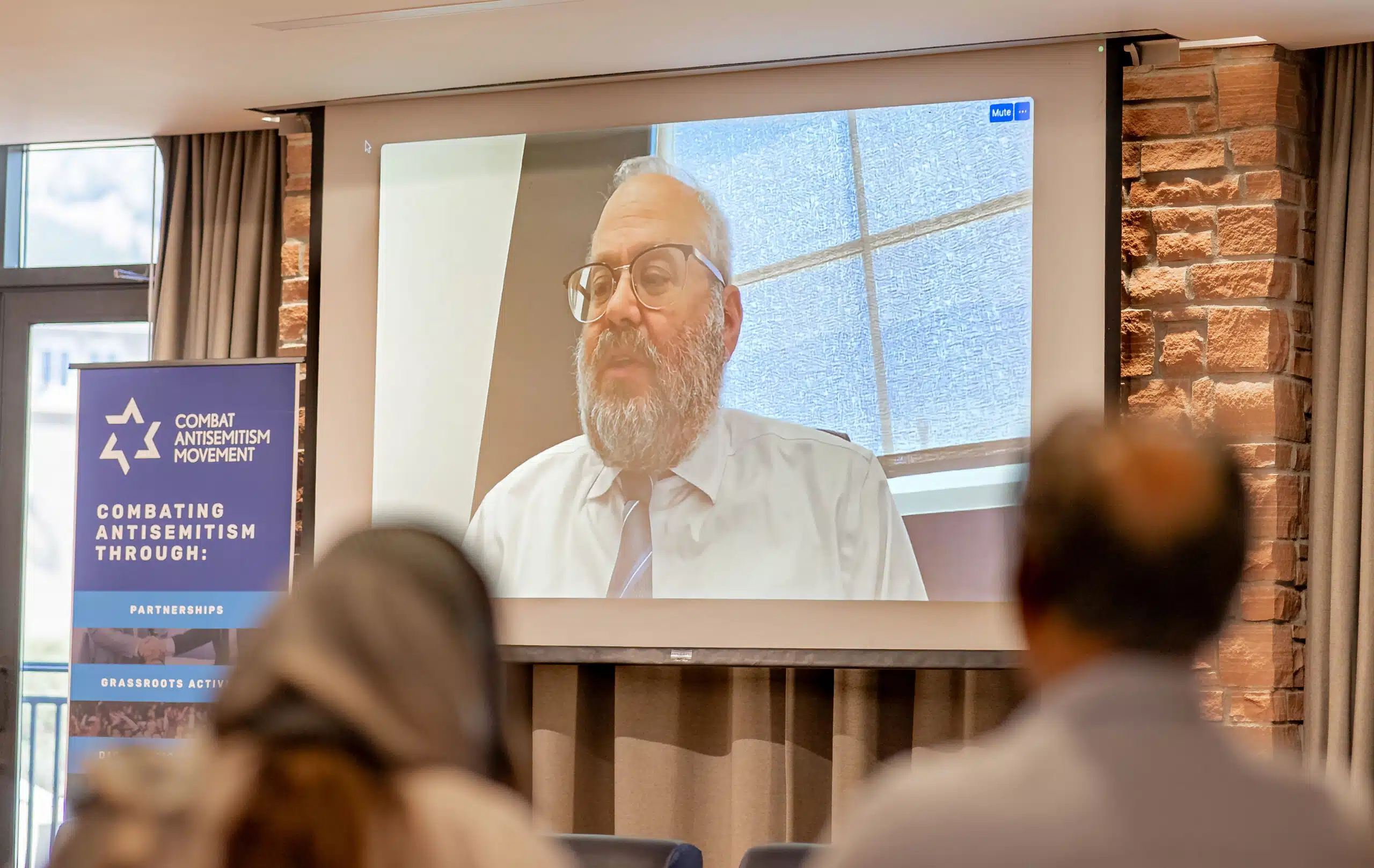Noor Dahri is the executive director of the London-based Islamic Theology of Counter Terrorism (ITCT) think tank. Recently, Dahri, who was born and raised in Pakistan, took to Twitter to speak out against a controversial “hadith” — or “saying of the Prophet” — that has long been a source of Muslim enmity toward Jews.
The #UK government should ban the teaching of one of the Hadiths against Jews in Mosque and Islamic institutions because this type of teachings generate hateful atmosphere against the peaceful Jewish community.
“𝙏𝙝𝙚 𝙇𝙖𝙨𝙩 𝘿𝙖𝙮 𝙬𝙞𝙡𝙡 𝙣𝙤𝙩 𝙘𝙤𝙢𝙚 𝙪𝙣𝙩𝙞𝙡 𝙩𝙝𝙚…
— Noor Dahri – نور ڈاہری 🇬🇧 (@dahrinoor2) April 30, 2023
Dahri is currently putting together a educational seminar on antisemitism that can be broadcast to experts and students at online events.
The Combat Antisemitism Movement (CAM) invited Noor for a conversation about the specific hadith he mentioned in his tweet, as well as the broader issue of Jew-hatred in the Muslim world.
A transcript of the discussion, edited for brevity and clarity, follows:
To start, tell us about the background of the hadith you tweeted about recently and how it has been used over the course of history.
There are a few things to mention about the hadith which I will do, but I will note it requires a very deep understanding and is a long debatable topic, and I’m not a hadith scholar. There are moderate Muslim scholars and experts, such as Sheikh Usama Hasan and Harris Rafiq, who can address it more wisely and in greater depth.
There is a huge chapter of “Last Day” predictions in the hadith books (“sayings of the Prophet”). Some scholars have classified this particular hadith as “hasan,” which means “good” (“good” is used to describe a hadith whose authenticity is not as well-established as that of a sahih, or “authentic,” hadith, but is sufficient to serve as supporting evidence), while other scholars have classified it as “da’if,” or “weak.”
So as I said, it is complicated to fully understand the precise background of this hadith.
And if we were to accept this hadith is “sahih,” as according to the narrations of Sahih Bukhari and Sahih Muslim, then we should also believe it is meant for the “Day of Judgement,” and Muslims cannot use it in the current day to create a hateful atmosphere for any political or religious reasons.
There are many “Last Day” ahadith (plural of hadith) relevant to corruption of Muslims in Islamic states, and if we started applying these ahadith to contemporary times, there would be bloodshed all over the Islamic world in fighting between Muslims, just as there is ongoing strife between Shi’as and Sunnis in many countries over religious and jurisprudence differences.
Is this hadith commonly taught across the Muslim world? How accurately does it reflect Islamic theology on the issue of relations with Jews?
We all know that by spreading this hadith without providing its full context, Muslim scholars have created intense hatred of Jewish communities worldwide. The surprising thing is this that early Muslims, such as companions of the Prophet Muhammad and their descendants, did not use this hadith to incite against Jews. History shows that Jews flourished in the early Islamic era and Islam allowed Jews to remain in Muslim lands, where Jews were treated well and there was fruitful coexistence. Since then, however, Islam has been politicized, and Muslim scholars started using such ahadith against the Jews and Hindus, which has undermined the peaceful nature of Islam.
Are there Islamic governments or institutions that have taken steps to mitigate the impact of this Hadith on Muslim thinking?
The Kingdom of Saudi Arabia under the leadership of Crown Prince Mohammed bin Salman has banned many Islamic literatures and texts that generated hate and extremism toward other religions and communities, and such types of sermons are also not permitted in the United Arab Emirates.
What can Western governments do to prevent this hadith from inciting hatred of Jews among Muslim populations in their countries?
Western governments should stop appeasing Muslims and devise and enforce strict rules where applicable to minimize extremism and stem hatred of other religious communities. Whenever I attend the Friday congregation prayer at mosque, I am sickened by listening to the hadith that “Jews have betrayed the Prophet of Islam,” and it really frustrates me when that they mention the hadith out of context — they mention as is, and full stop. They deliberately leave a gap for Muslims to succumb to hate by thinking that Jews were the enemies of the Prophet Muhammad and Islam.
I think governments should form committees — that include Muslim scholars who regularly analyze Friday sermons and madrassah syllabi — to monitor the issue.
In addition to this hadith, are there other sources of contemporary Muslim antisemitism that you feel must be addressed?
There are two types of sources that are being used by Muslims to fuel antisemitism against the Jewish community — political sources and religious sources.
There are many ahadith, and even Quranic verses, which have been misused and misquoted to inflame Jew-hatred around the world. There is a Quranic verse, for example, that has been widely used, particularly against me, along with the fatwa of burning hell fire, with people even calling me a “kafir” (“infidel”):
“O you who believe, do not take the Jews and the Christians for intimate friends. They are friends to each other.”
This verse is highly misunderstood by some Islamic scholars and majority of Muslims, who interpret it as meaning that Muslims cannot be friends with Jews or Christians. This is because, once again, it is taught out of context. In reality, the verse refers to group of Muslims in Medina who had personal and trade ties with Jews in the city, and when they became Muslims they maintained these relations, as permitted by Islam. However, a war erupted between Muslims in Medina and pagans in Mecca, and this verse specifically a clan of Jews from Medina who allied with the pagans in that conflict. It has no broader meaning, and it cannot be applied to modern-day circumstances.
Furthermore, another Quranic verse says:
“As to marriage, you are allowed to marry the chaste from among the believing women and the chaste from among those who have been given the Book before you (are lawful for you).”
This verse permits Muslims to marry a Jewish woman with full and equal rights — raising the question, how on one hand can the Quran ask Muslims not to be friends with Jews while on the other it allows them to marry Jewish women even without converting them? Muslim scholars should address these verses very carefully, and take into account all the background information.
There are also numerous political sources or propaganda narratives that are being used against the Jewish community around the world, featuring tropes such as:
• Jews control the world.
• Jews control the governments.
• Jews control the banks.
• Jews control the media.
• Jews were the actual perpetrators of the Holocaust.
• Jews were the founders of communism, Marxism, and sexism.
• Jews are against the Palestinians.
• Jews are occupiers.
• Jews are making way for the False Messiah.
• Jews are creating wars around the world.
To conclude, let me say that Islamic antisemitism can only be countered successfully with the help of moderate Muslim scholars and experts who know how to address the ideology effectively and offer solutions. Jewish organizations should reach out to such scholars and experts to work together to combat antisemitism. Cooperation with Muslims is vital if Jews want to halt the rapid growth of this hateful ideology in the Western world.
For more information on the Islamic Theology of Counter Terrorism (ITCT) think tank, please visit: itct.org.uk












